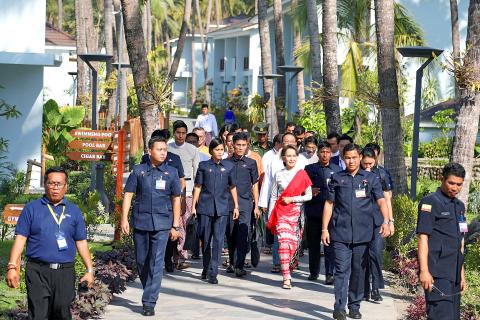Burmese State Counselor Aung San Suu Kyi yesterday touted Rakhine State’s “untapped” economic potential to investors, but glossed over violence that has scorched the area — most recently claiming the life of an 18-year-old civilian.
Rakhine, a vast stretch of arable land covering Myanmar’s western flank, with offshore oil and gas deposits and a long coastline, is also one of the country’s poorest states.
It has been scored by ethnic and religious conflict, especially in its restive northern region closest to Bangladesh. More than 740,000 Rohingya Muslims fled across the border after a bloody army crackdown in August 2017.

Photo: Reuters
The Myanmar Army is now also fighting rebels from the Rakhine ethnic minority, who are Buddhist.
However, in opening remarks to foreign companies at a Rakhine investment forum, Aung San Suu Kyi gave an upbeat characterization of the economic boon awaiting investors.
Much of the state’s potential “still remains untapped,” she said at the forum at Rakhine’s Ngapali beach, which is far south of the conflict area.
She trailed the promise of tourism, manufacturing and specifically the oil and gas sector as “one of the shining assets of Rakhine State.”
Participants from India, Japan, South Korea, Thailand and China were in attendance — the latter is building a massive port in the south of Rakhine and pipelines running through the strategically important state.
Aung San Suu Kyi blamed the international community for focusing “narrowly on negative aspects related to problems” in the northern part of the state, rather than the potential to uplift Rakhine through development.”
Rakhine is brimming with opportunities and “warm and friendly people, all eager to be part of the development adventure,” she said.
While Myanmar’s former junta stunted the Southeast Asian nation’s economy for decades, the advent in 2016 of a civilian government under Aung San Suu Kyi raised hopes of a turnaround in fortunes.
However, slow reforms, a weakening currency and conflict have stalled economic progress.
Aung San Suu Kyi’s image as an upholder of human rights has also been shattered by the Rohingya crisis, which the UN has called ethnic cleansing.
The treatment of the Rohingya has spooked Western investors and Myanmar has looked to its Asian neighbors to fill the gap.
As of last month, China, Singapore and Thailand led foreign investment in Myanmar, government statistics showed.
Aung San Suu Kyi’s positive comments were undercut by fresh fighting in Rakhine’s north between the military and the Arakan Army, an ethnic Rakhine force.
Villagers yesterday held a funeral for an 18-year-old Rakhine woman after she was killed in crossfire two days earlier as soldiers descended on their district in Rathedaung Township.
“She was cooking near the house of the village head,” a villager from Min Phoo village told reporters, requesting anonymity for safety reasons. “Our villagers did nothing wrong.”
Rakhine state police could not be immediately reached for comment.

Yemen’s separatist leader has vowed to keep working for an independent state in the country’s south, in his first social media post since he disappeared earlier this month after his group briefly seized swathes of territory. Aidarous al-Zubaidi’s United Arab Emirates (UAE)-backed Southern Transitional Council (STC) forces last month captured two Yemeni provinces in an offensive that was rolled back by Saudi strikes and Riyadh’s allied forces on the ground. Al-Zubaidi then disappeared after he failed to board a flight to Riyadh for talks earlier this month, with Saudi Arabia accusing him of fleeing to Abu Dhabi, while supporters insisted he was

‘SHOCK TACTIC’: The dismissal of Yang mirrors past cases such as Jang Song-thaek, Kim’s uncle, who was executed after being accused of plotting to overthrow his nephew North Korean leader Kim Jong-un has fired his vice premier, compared him to a goat and railed against “incompetent” officials, state media reported yesterday, in a rare and very public broadside against apparatchiks at the opening of a critical factory. Vice Premier Yang Sung-ho was sacked “on the spot,” the state-run Korean Central News Agency said, in a speech in which Kim attacked “irresponsible, rude and incompetent leading officials.” “Please, comrade vice premier, resign by yourself when you can do it on your own before it is too late,” Kim reportedly said. “He is ineligible for an important duty. Put simply, it was

The Chinese Embassy in Manila yesterday said it has filed a diplomatic protest against a Philippine Coast Guard spokesman over a social media post that included cartoonish images of Chinese President Xi Jinping (習近平). Philippine Coast Guard spokesman Jay Tarriela and an embassy official had been trading barbs since last week over issues concerning the disputed South China Sea. The crucial waterway, which Beijing claims historic rights to despite an international ruling that its assertion has no legal basis, has been the site of repeated clashes between Chinese and Philippine vessels. Tarriela’s Facebook post on Wednesday included a photo of him giving a

Syrian President Ahmed al-Sharaa on Sunday announced a deal with the chief of Kurdish-led forces that includes a ceasefire, after government troops advanced across Kurdish-held areas of the country’s north and east. Syrian Kurdish leader Mazloum Abdi said he had agreed to the deal to avoid a broader war. He made the decision after deadly clashes in the Syrian city of Raqa on Sunday between Kurdish-led forces and local fighters loyal to Damascus, and fighting this month between the Kurds and government forces. The agreement would also see the Kurdish administration and forces integrate into the state after months of stalled negotiations on